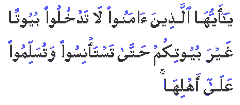No Peeking, Prostration of Gratitude, The Faithful
Issue 224 » May 30, 2003 - Rabi-al-Awwal 28, 1424
General
| Living the Quran |
Al-Noor (The Light) The Prophet (peace and blessings of Allah be upon him) explained that the reason why permission was to be sought was for fear that the person seeking to enter might see something private in the house: "The rule of seeking permission has been established for the sake of (not) seeing." (Reported by al-Bukhari, see Fath al-Bari, 11/24). Nowadays, when houses and buildings are too close to one another or even attached, and doors and windows face one another, the possibility of neighbours seeing one another has increased greatly. Many people do not lower their gaze, and some of those who live on higher floors may deliberately look down from their roofs and windows into neighbouring homes that are lower than their own. This is an act of betrayal and an invasion of their neighbours' privacy, as well as being the way that leads to unlawful deeds. A great deal of misery and trouble has resulted from this, and that fact that the Islamic Law counts the eye of the one who spies as worthless is sufficient proof of the seriousness of the matter. The Messenger of Allah (peace and blessings of Allah be upon him) said: "Whoever looks into somebody's house without their permission, it is permissible for them to put out his eye." (Reported by Muslim, 3/1699). According to another report, he said: "Put out his eye, and there will be no penalty or retribution." (Reported by Imam Ahmad, 2/385; see also Saheeh al-Jaami', 6022). Source: |
| Understanding the Prophet's Life |
Prostration of Gratitude When the Messenger of Allah, peace be upon him, used to receive good news, he would prostrate (sujud) himself and give thanks to Allah. Abdur Rahman ibn Awf, may Allah be pleased with him, narrated: "The Prophet entered upon us in the mosque, stood facing the qiblah, then prostrated himself and remained in sujud for a long time. I said to him: 'O Messenger of Allah, you prostrated yourself for such a long time that we thought Allah had taken your soul.' He said: 'Jibril came to me with good news. He told me: "Allah says, 'Whoever sends blessings on you, I will send sixty blessings on him in return, and whoever salutes you, I will salute him in return.'" so I prostrated myself and gave thanks to Allah." Source: |
| Words of Wisdom |
Characteristics of a Faithful It's only beseeming for the faithful that he should be sound of faith and a man of conviction. His knowledge entails forbearance as moderation is an adornment for the learned. He is wise but soft-hearted; well-dressed and restrained in order to conceal his indigence; never prodigal even if a man of substance; charitable and compassionate to the destitute; large-hearted and generous in giving to the kinsfolk their due; strenuous and unflinching in provided justice to others; never crosses the prescribed limits in favouring his near and dear ones nor does he find fault or cull out the errors of those whom he dislikes. A Muslim is indifferent to reviling and taunting, frolics and sports, decrials and backbiting. He never runs after what is not his right nor denies what he owes to others... Humble and submissive, devoted and enchanted, as a faithful is in his prayers, he is a messenger of cheer; his endurance is owing to the awe of God; his silence is for meditation and reflection; he pays attention for edification and instruction; he seeks company of the learned for acquiring knowledge; keeps mum to avoid transgression; and if he speaks, he speaks to spread the virtue.... - Hasan Al-Basri Source:
"Saviours of Islamic Spirit" - Abul Hasan Ali Nadwi, Vol 1, p. 42-43 |
